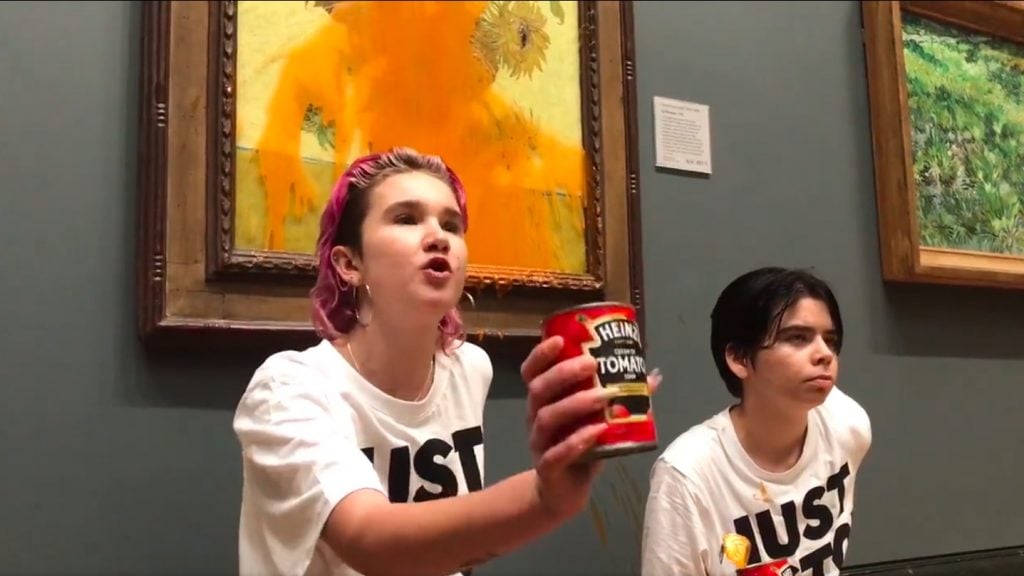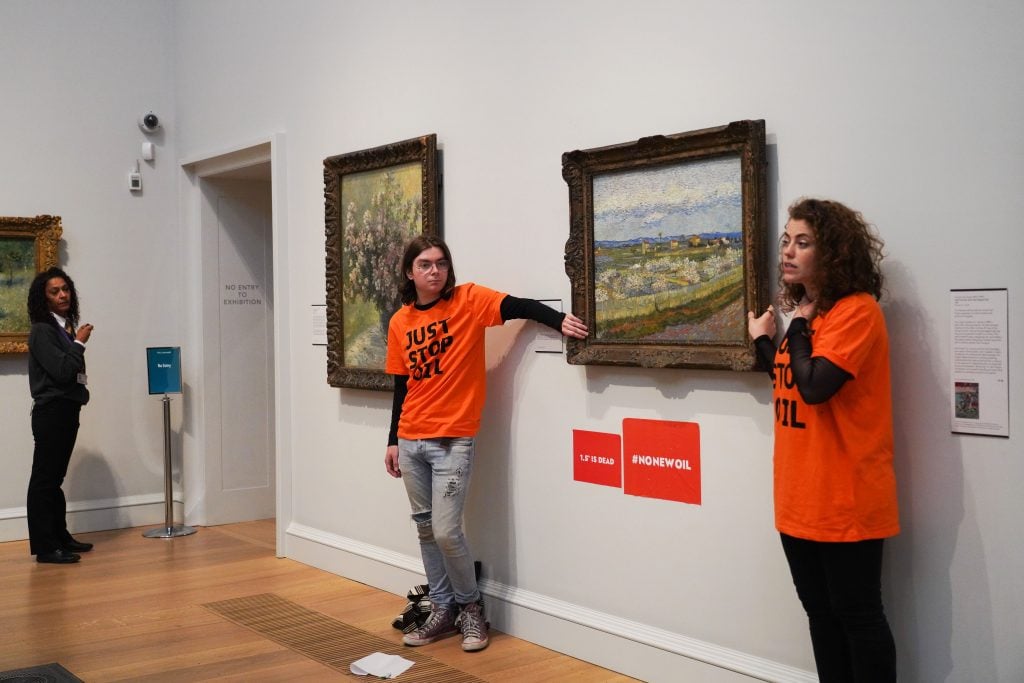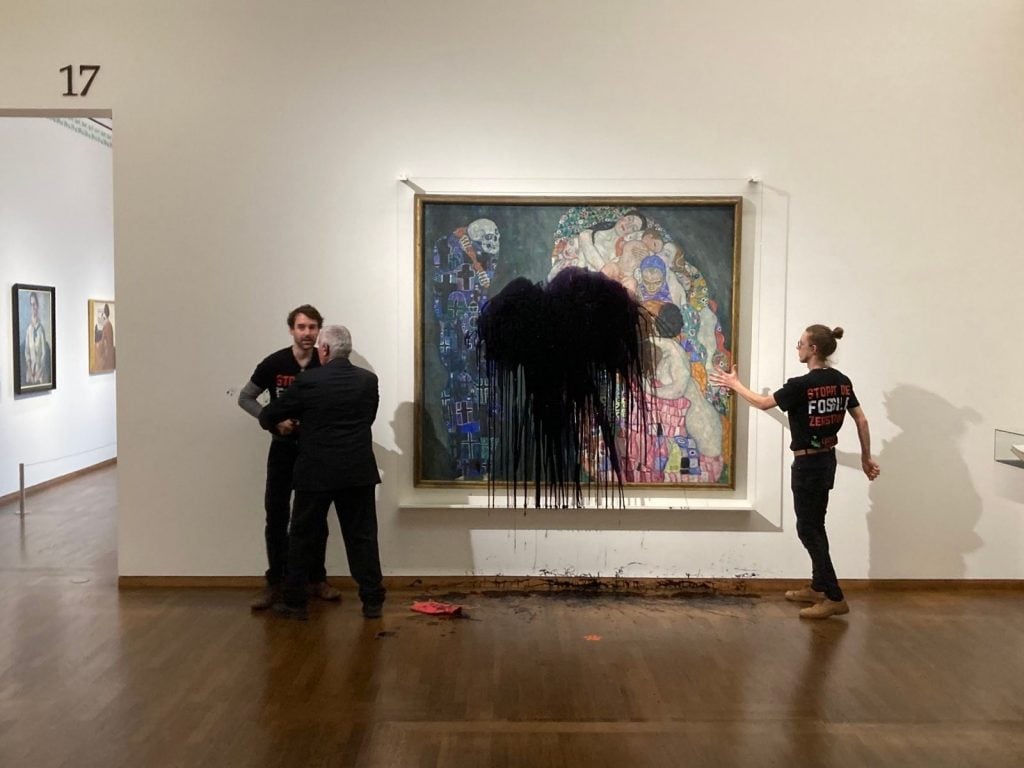Politics
Climate Activists Threaten to Start Slashing Paintings as They ‘Escalate’ Their Campaign to Model the Suffragist Movement
The group said it's looking to the suffragette protestors of the 1910s for inspiration.

The group said it's looking to the suffragette protestors of the 1910s for inspiration.

Taylor Dafoe

In 1914, activist Mary Richardson entered London’s National Gallery armed with a meat cleaver and slashed Diego Velazquez’s 17th-century painting The Rokeby Venus. The attack, she explained, was intended as a form of protest against the arrest of suffragette Emmeline Pankhurst.
“I have tried to destroy the picture of the most beautiful woman in mythological history as a protest against the government for destroying Mrs. Pankhurst, who is the most beautiful character in modern history,” Richardson wrote at the time. “Justice is an element of beauty as much as color and outline on canvas.”
Now, more than a century later, the climate activists of Just Stop Oil may look to Richardson’s attack for inspiration as they attempt to “escalate” their own protest campaign, which has heretofore involved defacing—but not damaging—some of the world’s best-known artworks.
In an interview with Sky News, Just Stop Oil spokesperson Alex De Koning said that his group may soon follow in the footsteps of suffragettes who “violently slashed paintings in order to get their messages across.”
“If things need to escalate then we’re going to take inspiration from past successful movements and we’re going to do everything we can,” De Koning went on. “If that’s unfortunately what it needs to come to, then that’s unfortunately what it needs to come to.”
When asked by the interviewer if that means that upcoming protests could include slashing artworks, the activist simply said, “It could potentially come to that at one point in the future, yeah.”

Just Stop Oil activists Louis McKechnie and Emily Brocklebank risk ten years in prison, gluing themselves to ‘Peach Trees Blossom’ by Vincent van Gogh at the Courtauld Gallery in London on June 30, 2022. Photo by Kristian Buus/In Pictures via Getty Images.
De Koning’s warning will surely sit uneasily with museum administrators in Europe and beyond who, for months now, have worked under the constant threat that their own institution’s masterpieces could be targeted next. Since this summer, nearly two dozen—and perhaps more—iconic artworks, including pieces by Picasso, Vermeer, and Monet, have been attacked by different climate activist collectives.
In late June and early July, for example, Just Stop Oil members glued themselves to four paintings across the U.K. A pair of protestors from Germany’s Letzte Generation group threw buckets of mashed potatoes on Monet’s Haystacks (1890) in October, while three activists from Italy’s Ultima Generazione tossed pea soup at Van Gogh’s The Sower (1888) the following month. Each episode went viral.
In all cases, the attacks were purposely orchestrated in ways that left the targeted artworks without permanent damage. However, many of the demonstrators now face the prospect of jail time for their stunts.
The incidents, which have now occurred in multiple countries around the world, fomented a wave of debates about the efficacy of protest tactics. One critic called the vandals “embarrassing”; another referred to them as “pathetic.” “Take it out on the oil companies you morons, not on innocent art,” the latter tweeted.

Two activists for Letzte Generation (Last Generation) throw “a black, oily liquid” at a painting by Klimt at the Leopold Museum in Vienna on November 15, 2022. Photo courtesy of Letzte Generation Österreich.
Last month, 92 representatives from cultural institutions published an open letter decrying the environmental groups’ campaigns. The activists “severely underestimate the fragility of these irreplaceable objects, which must be preserved as part of our world cultural heritage,” the letter read. “As museum directors entrusted with the care of these works, we have been deeply shaken by their risky endangerment.”
But De Koning and his group have not been deterred by the backlash or the prospect of punishment. Quite the opposite, it seems.
The activists are “not going to be intimidated by potential prison time,” the spokesperson said. “At least in prison you get three meals a day and shelter and water. In 20 years’ time, who knows if that’s still the case for millions of people.”
Last month, London police warned that the climate protestors may intensify their campaign in the lead-up to Christmas.
De Koning, for his part, said Just Stop Oil will “continue to escalate unless the government meets our demand” to halt future gas and oil projects.
“We’re fighting for our lives, why would we do any less?”